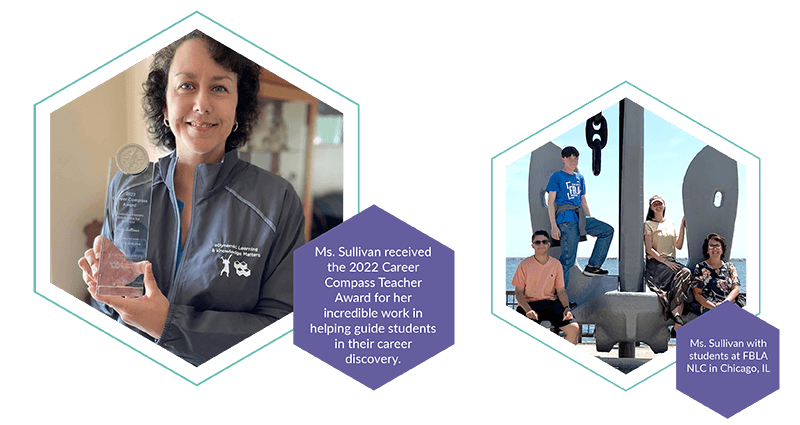Motivation to Meaning – A Story of a Teacher and Student Success – Amy Sullivan, Featured Educator

Featured Educator
Amy Sullivan, Cedar Crest High School, Lebanon, PA
Click here for a printable PDF of this article
Meeting the Needs of Diverse Populations
Teachers across the nation are seeking resources that engage their diverse student populations. It can be challenging to find resources to support a classroom full of needs, including English Language Learners or students who struggle to stay motivated in school.
Amy Sullivan, a high school business teacher from Cedar Crest High School in Lebanon, PA has been teaching for the past 27 years. She’s found that many of her students have trouble staying focused on reading assignments and projects that require research and presentations. She sought to find a solution that could help her students learn concepts, put into practice what they have learned in class, and make a connection between school and business. She found the Virtual Business simulations by Knowledge Matters over 20 years ago and has been using them ever since.

Ms. Sullivan discovered her career path in high school and is hoping to help her young students do the same. During her senior year of high school, Sullivan was inspired by her business teacher and became passionate about the idea of teaching. She originally thought she would be a secretary until her teacher led her to study business education in college. Her passion for teaching and business shines through her work with her students who she finds tend to need encouragement through engaging teaching methods.
Sullivan describes her community of Lebanon as primarily agricultural and becoming more urbanized in recent years. Cedar Crest High School has roughly 1,400 students with a large population of Hispanic students, some of which are English Language Learners.
Wall of Fame Drives Interest & Competition
After using Virtual Business simulations for nearly 20 years, Ms. Sullivan has an excellent grasp on what this tool offers her students. She blends them seamlessly with her curriculum and sparks some competition in the classroom with them as well. To acknowledge her students who have done the best financially in the final project portion of the sims, Sullivan developed a friendly competition board by creating a Wall of Fame in her classroom.
“It’s simply just a piece of paper I put on the wall and that seems to motivate them,” says Amy Sullivan, about her ‘Wall of Fame’ which became a staple in her classroom alongside Knowledge Matters’ simulations.
She uses the score from the final project and posts the overall profit of the top three students in her classroom. Since the class spends the whole semester working on the lessons, they have the opportunity to showcase what they learned. The students are eager to see who is on the Wall of Fame as they check to see if anyone has beaten their previous score. It becomes something that students look forward to in her class. One of her best students was on the wall of fame for nearly four years and was just recently knocked out of his position.
Two of her students in her spring management class were extremely motivated and eager to make it onto the Wall of Fame. One of the students spent 35 hours in two weeks working through the simulation, one that would usually take about four hours to complete. But in order to make it into the first place slot he continued to work through it to better his profit and made it onto the Wall. The student who came up into second place spent 28 hours in the week time period to earn his place.
This year she also tried Knowledge Matters’ multiplayer simulation function that allows students to compete collaboratively.
“When we did multiplayer, they were really into it, really competitive and wanted to be up at the top.”
Motivated by Rapid Results
Sullivan believes her students are also motivated by the instant gratification of finishing their simulations as well. At the end they are able to see their grade and know they passed instead of waiting for another type of assignment to be returned to them after being graded. For some of them it is just about putting in the work and seeing that “Congratulations!” message at the end that they did it!
“One thing that I do appreciate about the simulation is [that] even though we’re working towards the big project of completing the model, it’s broken down into so many steps that by the time we get there, they don’t have any problems.”
Sullivan gives her students about 45 minutes in the classroom to work through this part of the simulation final project and the two students mentioned previously took the extra time outside of class to put in the extra work. Most of her students put a lot of effort in during their class time but she says she always has a few who seem to have a little extra push when it comes to ranking first place on her Wall of Fame.
“Most don’t have to put any extra time in if they don’t want to. But then you’ve got a kid who goes home and works his full time job running the mogul. And I’ve had that happen a couple times. It just kind of blows my mind when I see the total amount of time that they’ve invested in it.”
Easy Implementation and Insights
Another aspect that Sullivan loves about using the simulations is how easy they are for teachers to implement and that they are kept up to date.
“If a teacher is looking for something to add to their course, they’re a great supplement. They can be a stand alone because you have the ability to customize the lessons that you’re going to be using.”
Sullivan also takes advantage of the insights the simulations offer by always looking at the total amount of time her students put into the simulations. If some of her students are having trouble in a certain area, she can easily go back to look at their “Individual Actions Journal” and see where they may have gotten stuck. She finds this helpful when they are on different schedules as well and not solely in her classroom, she can constantly check in on their progress. She also looks at their final statistics to keep an eye on how her class is doing as a whole.
Impact Made Personal
One of Sullivan’s favorite Knowledge Matters encounters came unexpectedly when she attended “A Teacher in the Workplace” experience at a local manufacturing company. A young man approached her and she was completely surprised when he asked if she remembered him. She did not recognize the man at first but did remember his name after he said he was a previous student of hers. He asked if she still teaches her management course and uses the Knowledge Matters simulations, to which she replied that she does. Sullivan was excited to hear that he often thinks back to the simulations in his current managerial position and during his college years.
“And I was like, Wow, that has a really long kind of lasting impact that I didn’t think about previously.”
Options for Scholarships and Additional Motivators
Not only does Ms. Sullivan utilizes various Knowledge Matters simulations in her classroom, she also encourages her Future Business Leaders of America (FBLA) student members to participate in the biannual Virtual Business Challenges offered. She recruits the students who put in many hours into the simulations and those who make it to the leaderboard.
“One thing that I appreciate about Knowledge Matters is that they sponsor competitions. For instance, the two students that work 35 and 20 hours a semester on their local projects to try to take their spot on the leaderboard, I will personally recruit them for next year.” said Sullivan. “In 2018 one of my teams took home 1st place in the nation in the spring Challenge.”
She generally has at least one team participate in the Management and Personal Finance tracks of the competition each fall and spring. It is just one more way to get her students motivated about what she’s teaching.
The Knowledge Matters simulations also tie into many of the other extracurricular activities she offers as well as other courses. Her students use different sims in the other classes and seem to appreciate the extra experience. She believes it is how she keeps her class enrollments high.
With many big employers in their area, including Hershey, she’s excited to help provide preparation and practice to ensure her students are ready to step into the workforce and be excited about their future.